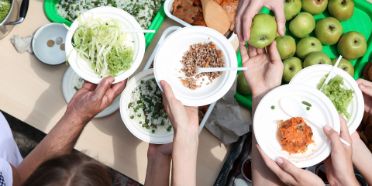Rural sociology
We study the people involved in agriculture and the interactions between agricultural and non-agricultural communities.

Using various methods of empirical social science research, we explore the opportunities and challenges faced by people in agriculture in the context of social, economic, political and environmental change.
We also analyse the sometimes-conflicting relationships between the agricultural and non-agricultural sectors. In doing so, we focus particularly on the social sustainability of agriculture. We work in an interdisciplinary and transdisciplinary way to achieve practical outcomes. To do this, we network with practitioners, the economic sector, extension and consulting services and researchers.
Range of services
We offer the following services to federal offices, associations, consulting institutions and companies, also in cooperation with other research institutions:
- Social science research and analyses using qualitative, quantitative and mixed-method approaches (interviews, surveys and participatory methods)
- Sociological support for agricultural projects, sustainable resource-use projects and other implementation-orientated research and practical projects
- Qualitative and quantitative evaluations
- Organisation, implementation and moderation of workshops, courses and scientific conferences
Expertise
We specialise in research and developing practical recommendations and measures in the following areas:
- Living conditions, quality of life and social sustainability in agriculture
- Negotiation and decision-making processes within producer families, taking into account gender and generational dynamics, particularly in the context of farm succession
- How producers adapt to political, economic, climate-related or technological changes
- Interactions and connections between various stakeholders in agriculture

Projects
Selected rural sociology projects
Women in agriculture: visibility, empowerment and networking
Women play diverse roles in agriculture, and their work – whether as (co-)farm managers, farmers or employees – is essential to the agricultural system. Despite this, the work of women on farms is often overlooked and their economic contribution is frequently underestimated. In this project, in collaboration with Vision Landwirtschaft, we explore the roles and economic contributions of women on farms through interviews and Living Labs. We also identify the needs of female practitioners to broaden their networks and enhance their visibility.
Project management
More information (in German)
Reinforcement of gender inequality through agricultural education
Women are strongly represented in agriculture, but mostly in the background. Only 7% of farm managers in Switzerland are women, while just under 20% of those completing the EFZ in agriculture are women. The fact that women are underrepresented as farm managers is due to the global tradition of handing over the business from father to son. This tradition is reflected in gender-specific agricultural training programmes in Switzerland. Together with INFORAMA Rütti, AGRIDEA and education-system stakeholders, we examine basic and specialised agricultural training in relation to traditional gender roles. Our aim is to create greater equal opportunities for women and men and inspire gender-neutral education in agriculture.
Project management
More information (in German)
Motivated and loyal Alpine staff – basic conditions for Alpine workplaces
In order to fulfil its economic, ecological and tradition-preserving functions, the Swiss Alpine economy is dependent on its employees. However, the staffing situation poses a major challenge on many Alpine farms. Therefore, it is crucial for Alpine managers to understand the expectations and loyalty of their staff. Together with the Swiss Alpine Association, we identify these factors by means of a quantitative online survey and in-depth qualitative interviews. Using these results, we collaborate with other stakeholders to create action recommendations that encourage Alpine staff to return to their jobs.
Project management
More information (in German)
Quality of life in milk production (MilkQualiLife)
Swiss milk producers have long been confronted with major challenges and burdens. The aim of this project, in cooperation with AGRIDEA, was to find out what their quality of life is like and what strategies they use to achieve a good quality of life. Qualitative interviews were conducted with milk producers. Many of their strategies focused on organising work to maximise “free time” and opportunities for change, but also allow a private life. Some strategies required financial resources, others did not. Counselling already provides support for quality of life, but not systematically. Quality of life aspects should therefore be consciously and consistently included in strategic and technical advice in future. The findings and their implementation make an important contribution to the social sustainability of Swiss farms and are also relevant beyond the dairy sector.
Project management
More information (in German)
Sustainability transformation of agricultural enterprises during farm succession
A fundamental change is needed to overcome the major social challenges and sustainability issues we face, particularly in the agricultural and food sectors. Farm succession – the transition from one generation to the next – is on the cards for many Swiss farms during the next 15 years, as around half of all farm managers will reach retirement age during this period. This moment offers the opportunity to implement profound changes toward a more ecologically, economically and socially sustainable agricultural system. Despite many studies on farm succession, there is a lack of specific findings on farms’ transformative capacity during the handover process. Also, the impact of farm social structures on these transformations has been largely unexplored. The aim of this project is to understand how transformations in agriculture occur and how sustainable changes in the agricultural and food sectors can be fostered. In particular, we want to analyse the role of farm succession in the transformation of farms.
Project management
More information (in German)
Rural sociology project support: selected examples
Ammonia odour: sustainability project in Central Switzerland
Central Switzerland is a hotspot for animal density and therefore nitrogen and odour emissions. Odour-related conflicts between the agricultural and non-agricultural populations as a result of such odour emissions occur there on a regular basis.
Technical, organisational and socio-cultural factors are all relevant in reducing odour emissions and addressing or preventing conflicts. Investigating socio-cultural factors is the rural sociology research group’s focus for this sustainability project.
From workshops, interviews and surveys, we record the impact of odour emissions on various stakeholder groups and their expectations regarding the quality of their living environment and landscape, as well as agriculture. This will help to identify measures to improve the odour situation within the project perimeter and to gain and disseminate knowledge for similar conflict situations.
Project management
More information (in German)
Adaptation of agriculture to climate risks
Climate change and its consequences pose major challenges for Swiss agriculture. In order to ensure long-term production capabilities, it’s crucial for farms to be able to adapt and transform.
As part of the RISC (Réflexion Innovation Soutien Climat) sustainable resource-use project led by Mandaterre, HAFL is helping around 40 farmers from canton Vaud to adapt their farms specifically to local and individual risks. The focus is on six strategic areas: Yield security, feed autonomy, increased control of soil erosion, minimisation of soil compaction risks, promotion of agro-ecosystem diversity, and business management and economic viability. The project should provide insights for the canton of Vaud and Switzerland as a whole.
The Agricultural Sociology research group supports the project by focusing specifically on resilience factors. In particular, we provide support in evaluating project results and surveying participants’ perceptions and attitudes towards climate risks or adopted measures, adaptations and transformations. We’re also actively involved in running workshops and other participatory initiatives to address the needs and concerns of participating farmers and support them in their efforts.
Project management
More information (in German)
Contact
Are you interested in working with us or do you have questions about our research in rural sociology? Please contact us.
We work closely with the Environmental and Food Sociology team.




